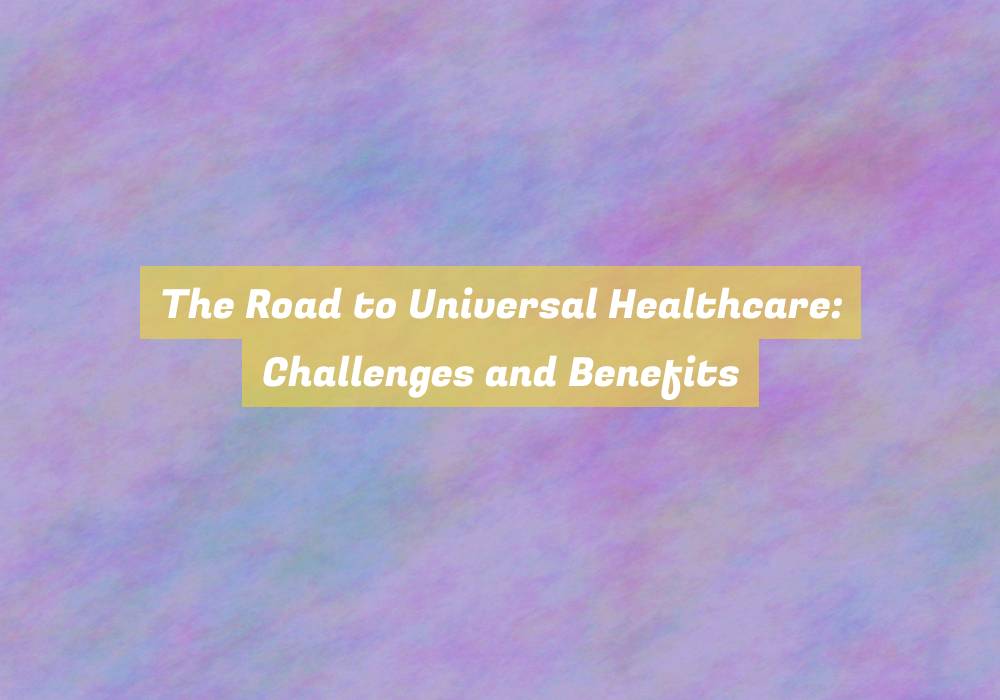The Road to Universal Healthcare: Challenges and Benefits
Embarking on the journey towards universal healthcare is like navigating a complex maze, with twists and turns that challenge both the mind and the heart.
The path ahead is fraught with obstacles, yet the promise of reaching the destination is tantalizing.
As you consider the challenges and benefits of this road, youG??ll find yourself grappling with intricate historical precedents, navigating the economic terrain, and contemplating the profound impact on society.
But as you delve into these complexities, youG??ll uncover the potential for transformative change and improved well-being for all.
Historical Challenges to Universal Healthcare
Overcoming resistance from vested interests has been a historical challenge to the implementation of universal healthcare. The initial push for universal healthcare faced opposition primarily from powerful stakeholders such as insurance companies, pharmaceutical corporations, and some healthcare providers. These entities were concerned about potential loss of profits and control over the healthcare system. As a result, they lobbied against reforms and attempted to sway public opinion through advertising and political influence.
In response to these challenges, proponents of universal healthcare had to navigate complex political landscapes and engage in extensive advocacy efforts to counter the influence of vested interests. This often involved mobilizing public support, conducting research to debunk misinformation, and forming alliances with influential policymakers.
Despite the formidable opposition, historical examples demonstrate that perseverance and strategic maneuvering can lead to successful implementation of universal healthcare. By understanding the historical challenges and the tactics used to overcome them, advocates can draw valuable lessons for the ongoing fight for healthcare reform. Today, similar obstacles persist, but the historical successes serve as a testament to the possibility of achieving universal healthcare despite entrenched resistance.
Economic Implications of Universal Healthcare
The historical challenges to implementing universal healthcare have significant economic implications, particularly in terms of the financial impact on various stakeholders in the healthcare industry.
For individuals, universal healthcare can alleviate the financial burden of high premiums, copayments, and deductibles. It allows people to seek medical attention without the fear of exorbitant medical bills.
Employers also stand to benefit from universal healthcare as they may experience reduced healthcare costs and increased productivity from a healthier workforce.
However, there are also potential downsides, such as increased taxes to fund the universal healthcare system.
Healthcare providers may face changes in reimbursement rates and regulations, impacting their revenue streams and operations.
Pharmaceutical and insurance companies may also experience shifts in their business models and profitability.
Access and Equity in Healthcare Delivery
Improving access to healthcare services is a critical component of achieving equity in healthcare delivery for all individuals. Access to healthcare shouldnG??t be determined by socio-economic status, geographical location, or any other discriminatory factors. ItG??s essential that everyone has the same opportunity to receive quality healthcare when needed. This means ensuring that healthcare services are geographically and financially accessible for all, regardless of income level or where they live.
One way to improve access and equity in healthcare delivery is by implementing policies that prioritize underserved communities. This could involve building more healthcare facilities in rural areas, where access to medical services is often limited. Additionally, providing financial assistance or subsidies for healthcare costs can help bridge the gap for those who canG??t afford medical treatment.
Furthermore, promoting diversity and cultural competence within the healthcare workforce is crucial for ensuring that all individuals receive respectful and effective care. By having a healthcare workforce that reflects the diversity of the population, it can help in addressing cultural barriers and improving communication between healthcare providers and patients from different backgrounds.
Societal Benefits of Universal Healthcare
Implementing universal healthcare brings about a transformative shift in societal well-being, fostering a sense of security and inclusivity for all members of the community. With universal healthcare, individuals no longer have to fear financial ruin due to medical expenses. This leads to reduced stress and anxiety, allowing people to focus on their overall well-being and productivity.
Moreover, universal healthcare promotes a healthier society by increasing access to preventive care and early interventions, ultimately reducing the burden of chronic illnesses and improving overall public health.
Furthermore, universal healthcare encourages a more equitable society, where everyone, regardless of socioeconomic status, has access to essential medical services. This fosters a sense of solidarity and reduces disparities in health outcomes, contributing to a more cohesive and harmonious community.
Additionally, it can lead to increased workforce productivity as individuals are healthier and more able to participate in the economy.
Conclusion
In conclusion, universal healthcare presents challenges, such as historical resistance and economic implications, but the benefits of improved access and equity in healthcare delivery are undeniable.
Societal advantages, including healthier populations and reduced healthcare disparities, make the road to universal healthcare worth pursuing.
Despite the hurdles, the goal of providing healthcare for all is a noble and achievable endeavor that can lead to a more just and prosperous society.







Your analogy of the journey toward universal healthcare as navigating a complex maze is particularly apt, especially when considering the historical entrenchments that have shaped our current landscape. The resistance from powerful stakeholders is not merely a matter of economics; it’s deeply intertwined with cultural attitudes towards healthcare as a commodity rather than a right. For instance, in countries with established universal healthcare, like the UK or Canada, there’s a greater public consensus around the idea of collective responsibility in health—something that seems elusive here.
You’ve really touched on something significant with the distinction between healthcare as a commodity versus a right. It’s striking how cultural attitudes can shape public policy in such profound ways. In my experience, many conversations about healthcare often drift toward individual responsibility, which can obscure the pivotal role of community and collective effort.